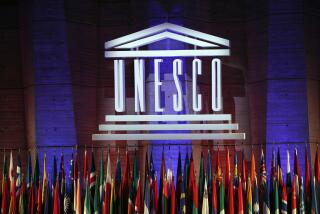Congress Leans Toward U.S. Returning to UNESCO Fold
- Share via
WASHINGTON — Congressional sentiment appeared to be building recently for the United States to return to membership in the U.N. Educational, Scientific and Cultural Organization, from which the Reagan Administration withdrew five years ago amid charges of mismanagement and waste.
After a two-day visit in Washington last week, Federico Mayor of Spain, UNESCO’s director general, described as “positive” the reception he received in meetings on Capitol Hill and at the State Department.
House Foreign Affairs Committee Chairman Dante B. Fascell (D-Fla.), who was among those who met with Mayor, said he was impressed with reforms launched in response to criticisms that the organization was spending too much of its budget at its Paris headquarters.
California Rep. Esteban E. Torres (D-La Puente), who served as ambassador to UNESCO during President Jimmy Carter’s Administration, said the improvements appear to be significant.
“I think there’s a growing appreciation in Congress for what the director general has done since he took over from M’Bow,” Torres said. His reference was to Amadou Mahtar M’Bow of Senegal, who left under fire in 1987 amid U.S. charges that he was pushing the organization in a leftist, anti-Western direction.
However, both Torres and Fascell said no U.S. return to membership is likely soon, largely because of constraints on the federal budget this year. The United States was paying $100 million annually--one fourth of UNESCO’s budget--when it pulled out in 1984.
The organization is part of the United Nations but is funded separately by member nations. It sponsors various programs mostly in the Third World, including literacy and cultural preservation projects.
California Rep. Mervyn M. Dymally (D-Compton), chairman of the Foreign Affairs subcommittee on international operations, said after meeting with Mayor that he plans hearings soon on the possibility of rejoining UNESCO.
Dymally credited Mayor with elimination of one M’Bow project that had aroused vigorous Western opposition: a “new world information order” that encouraged governments to license journalists.
More to Read
Sign up for Essential California
The most important California stories and recommendations in your inbox every morning.
You may occasionally receive promotional content from the Los Angeles Times.










